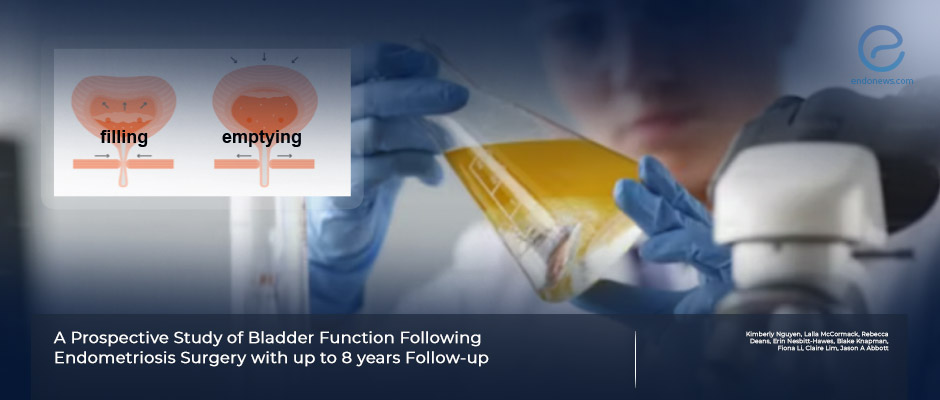Bladder Function Alterations Following Endometriosis Surgery
Feb 13, 2024
Post-operative urinary tract infections and urine retention are common among women with endometriosis.
Key Points
Importance:
- Urinary dysfunction before and after endometriosis surgery are common cause of discomfort among women, causing reduced quality of life.
Highlights:
- Regardless of the disease severity and location, the urinary functions of women operated for endometriosis decline over time.
What's done here:
- A randomized control study was performed in 2 university-affiliated hospitals in Sydney, Australia, between 2012 and 2019.
- Urinary functions of 289 women who consented to the study after laparoscopic surgery for endometriosis were re-assessed in 2020 and pre-and postoperative findings were compared.
- Medical history, surgical history, and urinary outcomes were collected to statistically analyze the long-term urinary function changes before and after the operation.
Key Results:
- Only 289 women participated in the study by filling out the questionnaires to create an analysis for a long-term follow-up of their urinary function.
- A significant worsening of symptoms for filling, voiding, incontinence and the quality of life was detected from pre-operative to postoperatively.
- No statistical difference was found based on the presence of uterovesical endometriosis.
- There was no statistical difference in various stages of endometriosis when comparing pre and postoperative urinary function changes.
- A higher mean voiding score was reported in women with postoperative urinary retention, and higher mean frequency scores were reported in women with postoperative urinary tract infections.
Lay Summary
Although endometriosis is a common gynecologic disorder, urinary tract involvement is present in only 1-5% of these patients. When endometriosis invades the urinary tract, clinical symptoms may vary from asymptomatic to frequency, urgency, bladder pain, hematuria, and recurrent urinary infections. These complaints lower the quality of life.
Surgical management of endometriosis may cause short or long-term urinary dysfunctions as well. These urinary symptoms are not life-threatening but may affect the quality of life.
To conduct a study for statistically comparing the initial and postoperative urinary functions of patients with endometriosis, Nguyen et al. from the School of Medicine, UNSW Sydney, New South Wales, Australia, set up based on 2-tertiary-level university hospital working groups.
The study includes histologically confirmed endometriosis patients operated on between 2012 and 2019, where baseline urinary function was determined; then participants were contacted in 2020 and asked to fill out questionnaires about filling, voiding, incontinence, and quality of life. More than half of the patients (n=289) consented to the nested study. After a postoperative range of 12–103 months, 12.1% needed treatment for bladder symptoms, and 28.0% reported urinary tract infections after their index surgery.
Pre- to post-operative period, a significant worsening of symptoms for filling, voiding, incontinence, and quality of life were observed. However, it was not related to the presence of uterovesical endometriosis or endometriosis stage.
The details of the study can be found in the recently published issue of the Journal of Minimally Invasive Gynecology.
Research Source: https://pubmed.ncbi.nlm.nih.gov/38042477/
urinary function filling of bladder voiding score incontinence quality of life laparoscopic surgery endometriosis.

